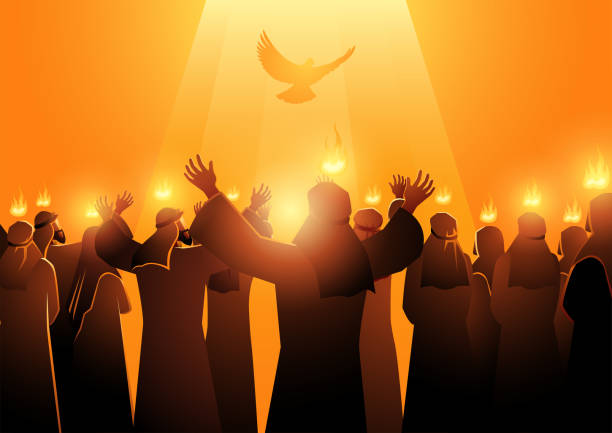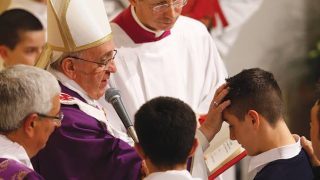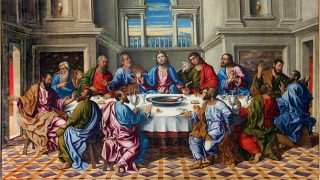
THEY WERE ALL FILLED WITH THE HOLY SPIRIT
HOMILY FOR PENTECOST SUNDAY, YEAR A. Readings: Acts 2:1-11; Psalm 103; 1 Corinthians 12:3-7, 12-13 and John 20:19-23.
Today we celebrate Pentecost Sunday, a day when the Church recalls the gifts of the Holy Spirit on Mary and the Apostles, the beginning of the Church and the start of her mission to all tongues and people and nations. Today officially ends the season of Easter for this year, tomorrow we shall continue with the ordinary season.
Scripturally, the word Pentecost is found only in the New Testament (Acts 2:1; 20:16 and 1 Cor. 16:18). The feast of Pentecost was initially known as the feast of Weeks, from which we have the seven weeks of Easter (Lev. 23:10-21) and also known as the feast of Harvest or First Fruit. The book of Leviticus ties the Feast of Pentecost to First Fruits, which is one among the three major annual festivals of the Jews. The Passover and the Unleavened bread were combined and celebrated as one festival (Lev 23:4-8; Deut. 16:1-8); while the third annual festival the Jewish men were expected to attend is the Feast of Booth/Tabernacle (Lev. 23:33-36).
In tying the Feast of Pentecost to First Fruits, the book of Leviticus says, “You shall count from the next day after the Sabbath, from the day that you brought the sheaf of the wave offering; seven Sabbaths shall be completed” (Lev. 23:15). From the Old Testament Day of Sabbath, the seven weeks plus one day (the day after the Sabbath) constitute the fifty (50) days associated with Pentecost. In counting the fifty days, the Church is in accordance with the Hebrew way of calculating the beginning and ending days of a given period. The first fruit of the wheat harvest presented to God at the Passover is also celebrated this day of Pentecost, and so it is called the day of the first fruits (Nm 28:26), from which we begin to perceive the fruits of the Holy Spirit. The first fruit marked the day when the Law was given to Israel. On the Old Testament Day of Pentecost Israel received the Law; on the New Testament Day of Pentecost the Church received the Spirit of Grace in fullness, the Spirit of unity, of love and of peace.
From the Gospel of today, we are told after the resurrection of the Lord, the disciples assembled at the Upper Room, with the doors shut for fear of the Jews, Christ appeared to them, first he greeted them with peace, knowing fully well they were troubled. They were still traumatized by the crucifixion, and are frightened concerning what might happened next. The doors being shut reflect the fear of the disciples, but will also demonstrate the power of the risen Christ, who can be contained neither by a rock tomb nor a lock door.
After calming their fears with the greeting of peace and the expression of joy when they saw the Lord, He commissioned them for the mission and breathed on them saying, “Receive the Holy Spirit” (Jn 20:22). He gave the disciples the Holy Spirit, bringing new life and the ability to carry out their mission “As the Father sent me, even so I send you” (v. 21). It seems John noted a deliberate connection between this breathing on the disciples and when at creation God breathed life into man. This was a work of re-creation, even as God breathed life into the first man. This is where the disciples were born again. They were made new men in order to be qualified for the work he had called them, for in this breathing he evidently alluded to the first creation of man, when God breathed into him the breath of live (Gen 2:7). This gift of the Spirit renews the life of these disciples just as Godly breath gave new life to the bones of the dead “Breathe into these slain and they shall live” (Ezek. 37:9). They have been afraid and confused, hidden in a locked room to escape danger. Now they find strength to stand up like the dry bones, unlock the door, go outside and begin their proclamation. Christ’s breathing upon the disciples was meant to convey the impression that his very own Spirit was imparted to them.
Immediately the reception of the Holy Spirit, he gave the disciples the authority to announce forgiveness of sin and to warn of guilt, as authorized by the Holy Spirit. We can say that Peter’s preaching on Pentecost, “Repent and be baptized… so that your sins may be forgiven” (Acts 2:38) was an exercise of this promised power to announce forgiveness of sins. It lays down the duty of the Church to proclaim forgiveness to the repentant believer, and the duty of the church to warn the unbeliever that they are in danger of forfeiting the mercy of God. The Church collectively declares the conditions on which sins are remitted, and with the plenary powers of an ambassador pronounces their remission or their retention. The work of Christ for His disciples on resurrection Sunday gives an ongoing pattern for His work among His people. He also promised the disciples that He will not leave them orphans before His ascension.
The first reading of today is a fulfilment of Christ’s promise to His disciples. On the day of Pentecost, they were all filled with the Holy Spirit and began to speak in other tongues.They all spoke in different tongues, yet there was a unity among the believers. Speaking in tongues has been the focal point for significant controversy in the church. People still ask the same question these bystanders asked on the day of Pentecost. There is no controversy that God, at least at one time, gave the Church the gift of tongues, but much of the controversy centers on the question, “What is God’s purpose for the gift of tongues?” The gift of tongues is a personal language of prayer given by God, whereby the believer communicates with God beyond the limits of knowledge and understanding (1Cor 14:14-15). It has an important place in the devotional life of the believer, but a small place in the corporate life of the church (1Cor 14:18-19), especially in public meetings (1 Cor 14:23). The gift of speaking in tongue is not for all believers (1Cor 12:30) so that we do not seek this gift merely to prove to others that we are really filled with the Holy Spirit. This way, it becomes counterfeit.
In view of the above that the second reading tells us there are varieties of gifts, but the same Spirit and there are varieties of service but the same Lord. To discover our own gifts and services to the Church, we must pay attention to Holy Spirit, we must be docile to him. We must let him lead and show us the best way. When the Holy Spirit fills our hearts, we will become capable of springing out flowers even in rocky ground or desert.
Conclusively, we pray with the invocation of the Holy Spirit, Come Holy Spirit and fill the hearts of the faithful and rekindle in us the ‘fire’ of your love. When fire burns an object, only the essential elements remain.
Happy Pentecost Sunday!
Fr. Ken Dogbo, OSJ










